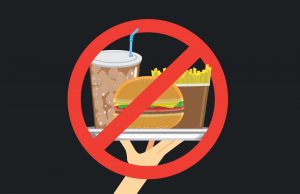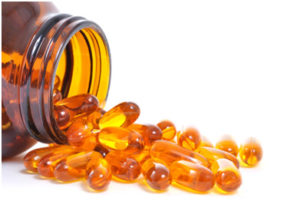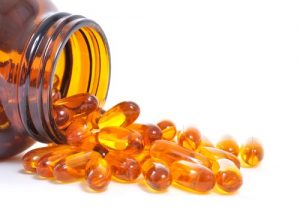Is This Just The Tip Of The Iceberg?
Author: Dr. Stephen Chaney
 Artificial colors are in the news again. And, unfortunately, what should solely be a health question has become political. Politics aside, most people fall into one of 3 camps:
Artificial colors are in the news again. And, unfortunately, what should solely be a health question has become political. Politics aside, most people fall into one of 3 camps:
- Artificial colors are bad for us and should be removed from the food supply.
- The fears about artificial colors are overblown.
- What are artificial colors and why should I care?
Let me start with the third camp. Every nutrition expert worth their salt will tell you that whole, unprocessed foods are best for us. The problem is that they have a low profit margin.
The food industry makes most of their money from highly processed foods (50-60% profit from highly processed foods versus 8.5% for unprocessed foods).
And the market for highly processed foods is very competitive. Let me give you some metrics to help you understand just how competitive the market is:
- In the average supermarket, unprocessed foods are located around the edge. The vast interior is mostly highly processed foods.
- The most recent studies report that 60-70% of the foods Americans consume are highly processed.
With so much competition, the food industry needs to make their brand of processed foods stand out.
- There are artificial preservatives to give processed foods long shelf life.
- There are artificial flavors and flavor enhancers to make them taste yummy.
- There are ingredients added to give them mouth appeal (how they feel in your mouth).
- And finally, there are artificial colors (also known as synthetic food dyes) for eye appeal. Those are added to make them “pop” – to make them say “eat me”.
The seven most common food colors are Blue #1, Blue #2, Green #3, Red #3, Red #40, Yellow #5, and Yellow #6. They make processed foods look good.
But there are also health concerns associated with artificial food colors. The two most common are:
- Cancer. Several studies have suggested that artificial food colors may increase the risk of cancer. However, because artificial food colors are added to foods of low nutritional value (candy, soft drinks, sugary cereals, etc.), it has been difficult to determine whether the increased cancer risk is due to the artificial colors or the foods they are found in.
- ADHD. The studies are a bit stronger for this category. Because artificial colors can be hidden in chocolate cookies (when you mix all the colors together you get brown anyway), it has been possible to perform double-blind, placebo-controlled studies. And since both the food color and placebo groups are getting chocolate cookies, the only difference between the groups is whether the cookies contain artificial colors.
So, in today’s “Health Tips From the Professor” I will summarize what we know about artificial food colors and ADHD. But first, let’s start with a brief overview of ADHD
A Brief Overview Of ADHD
 What is ADHD? ADHD is a broad term that encompasses two types of behaviors.
What is ADHD? ADHD is a broad term that encompasses two types of behaviors.
- The AD portion of ADHD stands for attention deficit.
-
- Children with attention deficit have difficulty focusing and staying on task.
-
- This can affect their learning in standard classroom settings. I underlined standard classroom settings for a reason, which I will come back to later.
- The H portion of ADHD stands for hyperactivity.
-
- Children with hyperactivity “bounce off walls” (I will define hyperactivity more precisely below.)
-
- This can lead to problems at home, in the classroom, and in relationships.
- Some children have both. If you are their parents, I can only say, “Lucky you”.
- The final D stands for disorder, implying that these conditions are not normal.
The ADHD epidemic.
- ADHD has increased by 89% in the United States in just 25 years (1997-2022).
- In 2022 11.5% of US children aged 3-17 were diagnosed with ADHD. That’s 7.1 million children.
Some experts claim that’s because of better diagnosis. Let’s examine that claim.
How is ADHD diagnosed?
 The American Psychiatric Society diagnoses attention deficit based on 3 or more of the following criteria:
The American Psychiatric Society diagnoses attention deficit based on 3 or more of the following criteria:
- Has problems staying focused.
- Doesn’t pay attention to details.
- Doesn’t seem to listen.
- Doesn’t follow instructions.
- Has problems organizing tasks.
- Avoids sustained mental effort.
- Is easily distracted.
For those of you who are parents or grandparents, I would simply ask, “Does any of this sound familiar?”
The American Psychiatric Society diagnoses hyperactivity based on 3 or more of the following criteria:
- Fidgets, taps hands, squirms in seat.
- Not able to stay seated.
- Runs around where it is inappropriate.
- Unable to play quietly.
- Always “on the go”.
- Talks too much.
- Has difficulty waiting for their turn.
- Interrupts or intrudes on others.
Again, for those of you who are parents or grandparents, I would simply ask, “Does any of this sound familiar?”
Even worse, the final diagnosis is based primarily on the subjective reporting of symptoms by teachers and parents. The psychiatric evaluation is done primarily to eliminate other mental or physical diseases as causes of the symptoms.
Is ADHD Overdiagnosed?
So. perhaps we should ask whether teachers and parents might be tempted to overestimate the severity of the symptoms.
- Class sizes are large, and there aren’t enough teacher’s aides.
- They don’t have the time to deal with a child that requires extra attention.
- It is easier to request an ADHD assessment, so that child can be put on drugs.
But there are other options. There are schools in which children with ADHD thrive, and many public schools have programs set up for ADHD children.
For parents,
- Parents don’t have the time they used to have.
- In most cases, both parents are working.
- Some are working from home. In theory that could give them flexibility to take care of their children. But remote work often involves online meetings and strict deadlines that leave little time for their children.
- And then there is social media. In today’s world, many parents are glued to their phones 24/7.
- It’s easier to request a hyperactivity assessment, so that child can be put on drugs.
Could the increase in ADHD diagnoses be real?
Most experts agree that the causes of ADHD are complex, with the top 4 causes being genetics, diet, family & social environment, and physical environment (environmental pollutants).
The simplest way to think about it is that genetics cocks the gun and one or more of the other causes pulls the trigger.
With that in mind, we need to ask ourselves, “Has diet, family and social environment, or our physical environment gotten worse over the past 25 years?” The answer is a clear yes for all three.
So, while part of the increase in ADHD could be due to overdiagnosis, part of it is likely to be real.
Why is the increase in ADHD diagnoses a concern?
 The answer is simple. The use of ADHD drugs has increased by 58% since 2012. Today over 50% of children diagnosed with ADHD are put on drugs. That’s a concern because:
The answer is simple. The use of ADHD drugs has increased by 58% since 2012. Today over 50% of children diagnosed with ADHD are put on drugs. That’s a concern because:
- Most of these drugs are stimulants.
- Many are amphetamines.
- They have serious side effects. For example:
- Loss of appetite and weight loss.
- Difficulty sleeping.
- Upset stomach and nausea.
- Feeling irritable, depressed, anxious, or tense.
-
- Many children don’t like how the drugs make them feel.
- They can be gateway drugs.
- They lose effectiveness over time. So, unless you have figured out the cause of the problem, the symptoms will return.
Because of this many parents are searching for natural solutions. One approach is to change their child’s diet. In today’s “Health Tips From the Professor” I will discuss the effect of one dietary change – the removal of artificial food colors from the diet.
Do Artificial Food Colors Cause ADHD?
 The idea that food additives – specifically artificial colors and preservatives – might be responsible for hyperactivity was first raised by Dr. Ben Feingold 50 years ago. He devised the Feingold Diet – a diet that was free of artificial food colors and preservatives.
The idea that food additives – specifically artificial colors and preservatives – might be responsible for hyperactivity was first raised by Dr. Ben Feingold 50 years ago. He devised the Feingold Diet – a diet that was free of artificial food colors and preservatives.
Some small-scale clinical studies suggested that the diet might be successful, and millions of parents used the diet for their hyperactive children with great success.
But the medical authorities pooh-poohed the Feingold Diet. They pointed out that when parents are putting their child on a special diet, they are also giving that child more attention – and it might be the parent’s increased attention that decreased the child’s hyperactive behavior.
They also pointed out that when you eliminate food additives from the diet you are decreasing the “junk” food and increasing fresh fruits and vegetables – in short, the child’s diet is much healthier.
They did a double-blind, placebo-controlled study and reported only 5% of the children with an ADHD diagnosis benefited from removing artificial food colors and preservatives from the diet. They considered 5% to be an artifact – just random noise in the statistical analysis of the data. Headlines proclaimed, “The Feingold Diet doesn’t work.”
So eventually the Feingold Diet lost popularity – but the idea that artificial food colors & preservatives might trigger hyperactivity has refused to go away.
The first inkling that the Feingold hypothesis might hold some water came from studies looking at the 5% of children whose ADHD symptoms improved when artificial colors were removed. When these children were evaluated in a second double-blind, placebo-controlled study, over 85% of them showed improvement in symptoms when artificial food colors were removed from their diet.
In short, this told us that artificial food colors and preservatives do cause ADHD symptoms in some children. The percentage of children is small, but these children are true responders.
This has led to further studies designed to provide a better estimate of the percentage of children whose ADHD symptoms are triggered by artificial food colors.
In 2004 a meta-analysis of 15 double-blind, placebo-controlled studies (DW Schah et al, Journal of Developmental & Behavioral Pediatrics, 25: 423-434, 2004) estimated that 11-28% of children with ADHD benefited from removal of artificial colors from their diet.
A more recent meta-analysis (IT Nigg et al, Journal of the American Academy of Child and Adolescent Psychiatry, 51: 86-97, 2012) estimated that 8% of ADHD children benefited from removal of artificial food colors from their diet.
And a pilot study published three years ago (AE Kirkland et al, Nutritional Neuroscience, 25: 159-168, 2022) suggests the effect of artificial food colors on ADHD symptoms may not be limited to children. They found a similar effect of artificial food colors on college students with ADHD.
In summary, the current evidence suggests:
- Artificial food colors (and other artificial ingredients) can trigger ADHD symptoms in both children and adults.
- The percentage of children and adults with ADHD who will benefit from removing artificial food colors from their diet is small (5-28%) but reproducible.
- If you or your child happen to be sensitive to artificial food colors, relief from ADHD symptoms could be as simple as eliminating artificial food colors from their diet.
Is This Just The Tip Of The Iceberg?

Earlier in this article I used the analogy that genetic predisposition to ADHD cocked the gun, but it was diet, family & social environment, and/or physical environment that pulled the trigger.
Then I summarized the evidence that artificial colors are one dietary component that “pulls the trigger” (causes ADHD) in sensitive individuals. But that leads to two questions:
- Is that all there is, or is that just the “tip of the iceberg”?
- Have there been changes in our diet that might explain the rapid increase in ADHD cases?
Let’s examine the data:
- In the 1970s when Dr. Feingold introduced his diet food additives were used sparingly.
-
- Today over 50% of the foods in the American diet contain more than 3 food additives.
- In the 1970s there were a few thousand food additives in the American food supply.
-
- Today there are more than 10,000 additives, and less than 5% of them have been tested for their effects on brain development in children.
- In the 1970s 10-15% of foods in the American diet were ultra-processed.
-
- Today 60-70% of the foods Americans eat are ultra-processed.
In short, in 1975 Dr. Feingold showed that artificial food colors and a handful of other additives triggered ADHD symptoms in a small percentage of children. Today our children’s diets are far worse, and they are exposed to thousands of untested food additives that did not exist in the 1970s.
Is this a coincidence or is this deterioration in diet and explosion of food additives driving the ADHD epidemic. Nobody knows.
But Pediatrics Professor Dr. Herbert Needleman has been quoted as saying, “We are conducting a vast toxicologic experiment in our society, in which our children and our children’s children are the experimental subjects.”
What Does This Mean For You?
 If you are the parent or grandparent of a child with ADHD, the simplest thing you can do is to remove foods with artificial colors and preservatives from their diet whenever possible. If the child is sensitive to food colors, that one simple change may reduce their symptoms dramatically.
If you are the parent or grandparent of a child with ADHD, the simplest thing you can do is to remove foods with artificial colors and preservatives from their diet whenever possible. If the child is sensitive to food colors, that one simple change may reduce their symptoms dramatically.
But, as I said above, artificial food colors and preservatives may just be the tip of the iceberg. My recommendation is to switch to a whole, unprocessed food diet for the entire family. Everyone in the family will be healthier, and you will have an even better chance of reducing your child’s ADHD symptoms.
And if you are looking for more ideas on natural approaches for children with ADHD, you may want to read a “Health Tips From the Professor” article I wrote several years ago based on a much longer publication by a pair of pediatricians who specialized in ADHD treatment.
They used ADHD medications as front-line treatment but researched natural approaches for those children who experienced unacceptable side effects from the drugs or for parents seeking a natural, drug-free approach. Their article was the result of 20+ years of testing various natural approaches with their ADHD patients. They found what worked and what didn’t work.
- The bad news is that every child was different. There was no silver bullet. There was no single natural approach that worked for every child.
- The good news was that at least one of the natural approaches in their arsenal worked for most of the children. It just required some time to find which approach(es) worked best for each child.
If you are searching for natural approaches to help your child or grandchild reduce their ADHD symptoms, this article is a great place to start.
The Bottom Line
ADHD cases are skyrocketing. Drugs work, but they have serious side effects. If you are the parent or grandparent of a child with ADHD, you may be searching for natural approaches to help that child control their ADHD symptoms. In this article, I discuss:
- The causes of ADHD and how it is diagnosed.
- Whether the rapid increase in ADHD cases is caused by overdiagnosis or the deterioration of our children’s diets.
- The evidence that artificial food colors and preservatives trigger ADHD symptoms in sensitive children.
- Other natural approaches that may reduce ADHD symptoms.
For more information on this study and what it means for you, read the article above.
These statements have not been evaluated by the Food and Drug Administration. This information is not intended to diagnose, treat, cure, or prevent any disease.
_____________________________________________________________________________
My posts and “Health Tips From the Professor” articles carefully avoid claims about any brand of supplement or manufacturer of supplements. However, I am often asked by representatives of supplement companies if they can share them with their customers.
My answer is, “Yes, as long as you share only the article without any additions or alterations. In particular, you should avoid adding any mention of your company or your company’s products. If you were to do that, you could be making what the FTC and FDA consider a “misleading health claim” that could result in legal action against you and the company you represent.
For more detail about FTC regulations for health claims, see this link.
https://www.ftc.gov/business-guidance/resources/health-products-compliance-guidance
______________________________________________________________________
About The Author
 Dr. Chaney has a BS in Chemistry from Duke University and a PhD in Biochemistry from UCLA. He is Professor Emeritus from the University of North Carolina where he taught biochemistry and nutrition to medical and dental students for 40 years. Dr. Chaney won numerous teaching awards at UNC, including the Academy of Educators “Excellence in Teaching Lifetime Achievement Award”. Dr Chaney also ran an active cancer research program at UNC and published over 100 scientific articles and reviews in peer-reviewed scientific journals. In addition, he authored two chapters on nutrition in one of the leading Biochemistry textbooks for medical students.
Dr. Chaney has a BS in Chemistry from Duke University and a PhD in Biochemistry from UCLA. He is Professor Emeritus from the University of North Carolina where he taught biochemistry and nutrition to medical and dental students for 40 years. Dr. Chaney won numerous teaching awards at UNC, including the Academy of Educators “Excellence in Teaching Lifetime Achievement Award”. Dr Chaney also ran an active cancer research program at UNC and published over 100 scientific articles and reviews in peer-reviewed scientific journals. In addition, he authored two chapters on nutrition in one of the leading Biochemistry textbooks for medical students.
Since retiring from the University of North Carolina, he has been writing a weekly health blog called “Health Tips From the Professor”. He has also written two best-selling books, “Slaying the Food Myths” and “Slaying the Supplement Myths”. And most recently he has created an online lifestyle change course, “Create Your Personal Health Zone”. For more information visit https://chaneyhealth.com.
For the past 53 years Dr. Chaney and his wife Suzanne have been helping people improve their health holistically through a combination of good diet, exercise, weight control and appropriate supplementation.



























